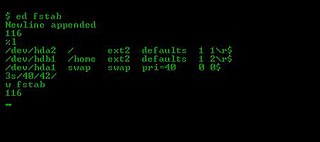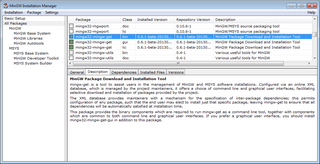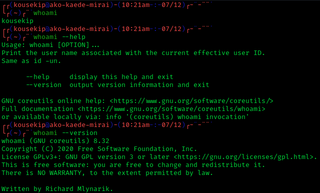Related Research Articles

Cygwin is a Unix-like environment and command-line interface for Microsoft Windows.

ed is a line editor for Unix and Unix-like operating systems. It was one of the first parts of the Unix operating system that was developed, in August 1969. It remains part of the POSIX and Open Group standards for Unix-based operating systems, alongside the more sophisticated full-screen editor vi.
The Portable Operating System Interface is a family of standards specified by the IEEE Computer Society for maintaining compatibility between operating systems. POSIX defines both the system and user-level application programming interfaces (APIs), along with command line shells and utility interfaces, for software compatibility (portability) with variants of Unix and other operating systems. POSIX is also a trademark of the IEEE. POSIX is intended to be used by both application and system developers.
uniq is a utility command on Unix, Plan 9, Inferno, and Unix-like operating systems which, when fed a text file or standard input, outputs the text with adjacent identical lines collapsed to one, unique line of text.
In computing, tar is a computer software utility for collecting many files into one archive file, often referred to as a tarball, for distribution or backup purposes. The name is derived from "tape archive", as it was originally developed to write data to sequential I/O devices with no file system of their own, such as devices that use magnetic tape. The archive data sets created by tar contain various file system parameters, such as name, timestamps, ownership, file-access permissions, and directory organization. POSIX abandoned tar in favor of pax, yet tar sees continued widespread use.

In Unix-like and some other operating systems, the pwd command writes the full pathname of the current working directory to the standard output.
basename is a standard computer program on Unix and Unix-like operating systems. When basename is given a pathname, it will delete any prefix up to the last slash ('/') character and return the result. basename is described in the Single UNIX Specification and is primarily used in shell scripts.

uname is a computer program in Unix and Unix-like computer operating systems that prints the name, version and other details about the current machine and the operating system running on it.

MinGW, formerly mingw32, is a free and open source software development environment to create Microsoft Windows applications.
The archiver, also known simply as ar, is a Unix utility that maintains groups of files as a single archive file. Today, ar is generally used only to create and update static library files that the link editor or linker uses and for generating .deb packages for the Debian family; it can be used to create archives for any purpose, but has been largely replaced by tar for purposes other than static libraries. An implementation of ar is included as one of the GNU Binutils.

tr is a command in Unix, Plan 9, Inferno, and Unix-like operating systems. It is an abbreviation of translate or transliterate, indicating its operation of replacing or removing specific characters in its input data set.

wc is a command in Unix, Plan 9, Inferno, and Unix-like operating systems. The program reads either standard input or a list of computer files and generates one or more of the following statistics: newline count, word count, and byte count. If a list of files is provided, both individual file and total statistics follow.
In Unix and Unix-like operating systems, iconv is a command-line program and a standardized application programming interface (API) used to convert between different character encodings. "It can convert from any of these encodings to any other, through Unicode conversion."

cksum is a command in Unix and Unix-like operating systems that generates a checksum value for a file or stream of data. The cksum command reads each file given in its arguments, or standard input if no arguments are provided, and outputs the file's 32-bit cyclic redundancy check (CRC) checksum and byte count. The CRC output by cksum is different from the CRC-32 used in zip, PNG and zlib.
The GNU Core Utilities or coreutils is a package of GNU software containing implementations for many of the basic tools, such as cat, ls, and rm, which are used on Unix-like operating systems.

rm is a basic command on Unix and Unix-like operating systems used to remove objects such as computer files, directories and symbolic links from file systems and also special files such as device nodes, pipes and sockets, similar to the del command in MS-DOS, OS/2, and Microsoft Windows. The command is also available in the EFI shell.

In computing, whoami is a command found on most Unix-like operating systems, Intel iRMX 86, every Microsoft Windows operating system since Windows Server 2003, and on ReactOS. It is a concatenation of the words "Who am I?" and prints the effective username of the current user when invoked.

A Unix-like operating system is one that behaves in a manner similar to a Unix system, although not necessarily conforming to or being certified to any version of the Single UNIX Specification. A Unix-like application is one that behaves like the corresponding Unix command or shell. Although there are general philosophies for Unix design, there is no technical standard defining the term, and opinions can differ about the degree to which a particular operating system or application is Unix-like.

Unix is a family of multitasking, multi-user computer operating systems that derive from the original AT&T Unix, whose development started in 1969 at the Bell Labs research center by Ken Thompson, Dennis Ritchie, and others.